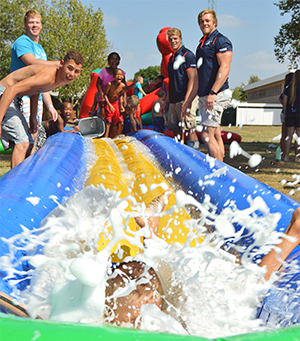
A group of third-year medical students organised a fun day for Ons Kinderhuis as part of their community service project.
|
As part of their curriculum, third-year MBChB students are required to complete a community service project in collaboration with a specific NGO in Bloemfontein. Not only do these projects serve an academic requirement, but also echo the spirit of service and compassion emblematic of the Human Project of the University of the Free State (UFS).
One group of students chose to pour their time and care into Ons Kinderhuis–home to 100 children with special needs. Since their involvement, these medical students have helped improve the home’s facilities and also hosted various fun days for the staff and children.
The latest fun day was celebrated on Saturday 12 March 2016. The festivities were kicked off in the morning by a game of soccer using the brand-new goal posts recently built by the medical students. It was difficult to decide who were more excited – the children or the staff – when some of the Cheetah rugby players joined the event. A slippery slide came in handy to wash off sticky hands and mouths and for little bodies with lots of energy the jumping castle was a perfect answer. Faces were painted and a banner created while music and the smell of the braai floated into the autumn air.
“I couldn't help but be proud of my team and thankful for this opportunity,” said Willem Potgieter, one of the student volunteers. Seeing the smiles on the children’s faces made it all worthwhile. “It was truly a humbling and a great learning experience for each and every one of us,” Willem said.
This group of medical students consist of Burger Oosthuizen, Marié Engelbrecht, Lourens Badenhorst, Dirki Wessels, Roodt Ehlers, Shirley-Louise du Plessis, Mariet Geldenhuys, Louise-Mari Zietsman and Willem Potgieter.